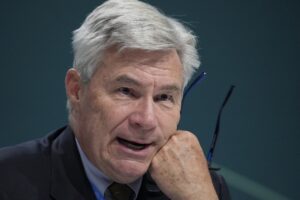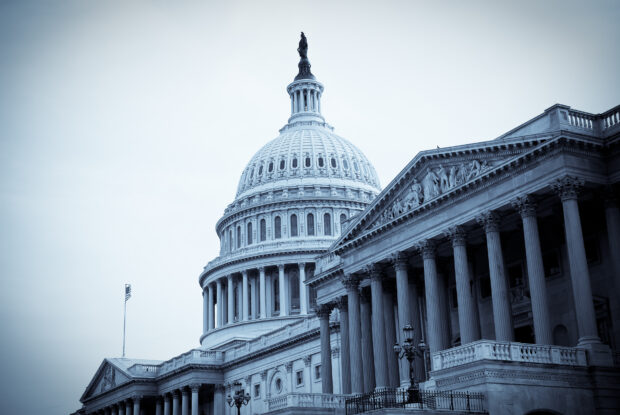The U.S. Senate Budget Committee on Wednesday held a hearing to release a study they said confirms climate change is increasing non-renewal rates in multiple states, but the insurance industry clapped back by saying extreme weather is just part of the problem.
During the 90-minute hearing, entitled “Next to Fall: The Climate-Driven Insurance Crisis is Here – And Getting Worse,” chairman Sen. Sheldon Whitehouse (D-R.I.) said the committee’s conclusions were based on non-renewal data collected from 23 insurers representing about two-thirds of the homeowners insurance market, covering years 2018 through 2023.
The data, according to the report, “confirm that it is climate change that is driving increasing non-renewal rates” not just in the markets considered to see the most insurance-market turmoil – Florida, Louisiana, California and Texas – but in other states such as the Carolina, New England, Oklahoma, the Northern Rockies, and Hawaii as well.

Whitehouse said the report contains information regarding the questions of when and how bad the “crisis” will get.
“The answers are ‘now’ and ‘very,’ and it’s only getting worse,” Whitehouse said during the hearing.
While Florida was found to have the highest average rate of non-renewals, Texas is not in the top 10, Whitehouse said. The findings of non-renewals in a wide range of states demonstrate that “multiple climate-related effects are destabilizing widespread insurance markets,” Whitehouse added.
However, Robert Hartwig, during his testimony before the committee said the insurance industry is “not in the midst of a climate-driven crisis nor is it about to ‘fall.'” Hartwig, a professor of risk management at the University of South Carolina and former president of the Insurance Information Institute, said there is “no evidence that the industry is on the precipice of collapse” despite recent increases in catastrophe losses.
Hartwig said the committee’s conclusions were based on non-renewal rates skewed by increases in Florida and California, and he drew a distinction for the committee between a “crisis” and a “dislocation” within the marketplace while pointing out other factors influencing industry actions including inflation, litigation, fraud, as well as increases in population and exposures.
Comments from Jimi Grande, the National Association of Mutual Insurance Companies’ (NAMIC) senior vice president of federal and political affairs, were more pointed. In the shadow of another government shutdown, the committee chose to “manufacture an insurance crisis singularly driven by climate change to score political points,” he said.
“This hearing shrugs off the toxic mix of extreme weather, inflation and economic uncertainty, and legal system abuse driving up costs for both insurers and policyholders all at once,” Grande continued. “It does nothing to address climate change challenges or protect Americans from rising costs rooted in poor policy choices, and sadly devalues this committee’s work.”
In a statement released prior to the hearing, David A. Sampson, president and CEO of the American Property Casualty Insurers Association (APCIA), said, “Property insurance losses have been escalating and it’s not just the weather. The 40-year-high inflation is an outsized influence on insurance affordability, coupled with the other primary cost drivers including, overbuilding in high-climate risk regions, legal system abuse, and increasing regulatory costs and constraints.”
“Collecting and analyzing homeowners’ insurance nonrenewal data does not provide relevant information tying rising insurance losses to climate risk,” he said, adding that “government risk and interference are primary drivers in whether consumers are able to obtain policies from a competitive private insurance market or end up in government-established residual markets.”
Whitehouse said the National Association of Insurance Commissioners (NAIC) submitted a letter to the committee that said some of the data collected may have “inconsistencies and inaccuracies.” The letter contained no more detail and the committees will follow up with the NAIC, Whitehouse said, adding that no insurers submitting data called out any concerns.
Also testifying was independent insurance agent Ernest Shaghalian Jr. of Butler & Messier Insurance Agency based in Whitehouse’s home state of Rhode Island.
“The insurance marketplace in Rhode Island is the worst I’ve seen it in my 40 years as an agent, and getting worse each year,” he said. “The increase in the frequency and severity of weather events has created havoc in the cost and availability of home, business, and even auto insurance.”
He said the state’s coastal communities have seen a more than 560% increase in non-renewals, and two insurers left the market. One is in receivership. A third insurer announced it would non-renew all personal property policies in the Ocean State.
“If I had a professional Christmas wish list, at the top of it would be that states require insurance companies to give more advanced notice before allowing [insurers] to withdraw from territories,” Shaghalian said.’When insurance companies don’t accept minions of dollars of premiums even at today’s higher prices, that tells me they think things are going the wrong way. The crisis is not with insurance companies; the crisis is with consumers.”





















 Winter Storm Fern to Cost $4B to $6.7B in Insured Losses: KCC, Verisk
Winter Storm Fern to Cost $4B to $6.7B in Insured Losses: KCC, Verisk  What Analysts Are Saying About the 2026 P/C Insurance Market
What Analysts Are Saying About the 2026 P/C Insurance Market  Modern Underwriting Technology: Decisive Steps to Successful Implementation
Modern Underwriting Technology: Decisive Steps to Successful Implementation  Nearly 26.2M Workers Are Expected to Miss Work on Super Bowl Monday
Nearly 26.2M Workers Are Expected to Miss Work on Super Bowl Monday 




